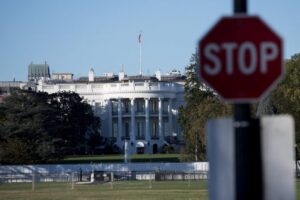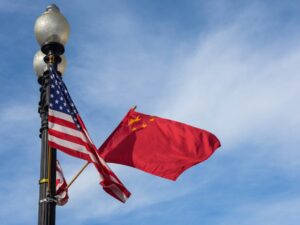
Liu Huawen: Executive Director and Researcher at the Human Rights Study Center of the Chinese Academy of Social Sciences
Xi Jinping: Respecting and Securing Human Rights systematically collected a series of important speeches on respecting and protecting human rights delivered by President Xi Jinping, including important views and proposals on China’s active participation and promotion in global governance on human rights.
Being fully aware of its status as a permanent member of the United Nations Security Council and a member of the Human Rights Council, China has attached equal importance to human rights initiatives both at home and abroad. This strategy says a lot about how committed contemporary China is to human rights. In the congratulatory letter sent by President Xi Jinping to the “Beijing Forum on Human Rights” on September 16, 2015, two “unwavering commitments” were highlighted, that is, the Chinese people will unswervingly follow the path of peaceful development and implement unwavering the cause of Chinese and global human rights.
Today, the world is undergoing profound changes not seen in centuries. On the one hand, technological and scientific advances and the sophisticated transport and communications network give a strong impetus to economic and social development, creating unprecedented opportunities for the promotion of human rights around the world. On the other hand, pressures and challenges take new forms, presenting unprecedented risks and challenges for humanity. As President Xi Jinping has pointed out, human rights are the symbol of the progress of human civilization, therefore the goal of maintaining and nurturing the momentum and commitment to human rights deserves global attention.
Active participation in promoting human rights within the framework of global governance embodies a meaningful approach and an important milestone for China to achieve human rights-based development. In the book Xi Jinping: Respect and Guarantee of Human Rightsamong the proposals presented by President Xi Jinping, four aspects are illustrated:
First, propose true multilateralism and safeguard the UN-centered international system and international order based on international law.
Addressing the 76th session of the UN General Assembly on September 21, 2021, President Xi Jinping pointed out, “We must improve global governance and practice true multilateralism. In the world there is only one system, which is the international system centered on the UN, and one order, which is the international order based on international law” and highlighted that the UN “has to promote work in the three domains of security in a balanced way, development and human rights”.
China has been elected as a member of the UN Human Rights Council many times with a large number of votes, which demonstrated the recognition of the majority of countries in the world regarding the results achieved by China in the cause of human rights and the expectation of a more important role played by China on the international stage.
Second, all countries must emphasize the importance of the 2030 Agenda for Sustainable Development and create a virtuous cycle in which cooperation, development and human rights are mutually reinforcing.
China is the first developing country that has achieved the UN Millennium Development Goal, and China’s contribution to global poverty reduction exceeds 70%. While focusing on its own development, China is at the same time actively promoting global economic growth. With great attention to the elaboration and implementation of the UN’s sustainable development agenda, China actively advocates and practices the UN’s 2030 Agenda for Sustainable Development.
In the congratulatory letter sent on December 4, 2016 to the “International Seminar on the 30th Anniversary of the Adoption of the UN Declaration on the Right to Development”, President Xi Jinping commented: “China hopes that international society, using the 2030 Agenda of the United Nations for Sustainable Development as a new starting point, strive to realize common development by navigating a fair, open, comprehensive and innovative path.”
China has a constructive position and proposition, that is, to pay attention and give genuine impulses to human rights through dialogue and cooperation and consolidate its development base. In 2013, President Xi Jinping proposed the Belt and Road initiative (BRI, acronym in English). A BRI It has Chinese origins and belongs to the entire world, serving as a public good that benefits the global community.
China has aligned its domestic interests with international ones. In the domestic context, there is a general consensus that only development can make a difference. In dealing with the international community, China, like the UN, has put development front and center, and promoted peace, development and human rights.
Third, care about the growth of developing countries and south-south cooperation.
As the largest developing country, China faces the same or a similar task as other developing countries on the path to survive and prosper through economic and social development. Indeed, a basic principle of China’s foreign policy is to strengthen solidarity and cooperation with third world countries.
On January 25, 2021, at the Davos Agenda meeting of the World Economic Forum, Chinese President Xi Jinping, President Xi Jinping emphasized the need to “end the divide between developed and developing countries and jointly promote growth and prosperity for all.” He noted: “…as developing countries grow, global prosperity and stability will be placed on a more solid foundation, and developed countries will benefit from this growth. The international community must keep its eyes on the long term, honor its commitment, provide necessary support to developing countries and protect their legitimate development interests.”
Fourth, all countries must uphold the common values of humanity by playing an active role in building a global community with a shared future.
Nowadays, faced with humanity’s challenges, no country can face them in isolation. In President Xi Jinping’s thoughts on China’s governance, a prominent proposal is the construction of a community of common destiny for humanity. The facts demonstrated that this proposal is well proven and forward-looking, as it describes the nature of the international community and its future trajectory.
With efforts made by China, the concept of a community of common destiny for humanity has been included in resolutions of the Security Council, the Economic and Social Development Council and the UN Human Rights Council, making it an increasingly significant component in the international human rights discourse. Respecting and protecting human rights is a universal consensus of the international community, and international solidarity and cooperation are becoming increasingly important. Therefore, adhering to the common values of peace, development, equity, justice, democracy and freedom for all humanity proposed by President Xi Jinping, and actively promoting the construction of a community of common destiny for humanity, is a fundamental guideline for the participation and promotion of global human rights governance.
Source: http://www.chinahoje.net/participacao-e-promocao-ativas-chinesas-na-governanca-global-sobre-direitos-humanosparticipacao-e-promocao-ativas-chinesas-na-governanca-global-sobre-direitos-humanos/

